 Petzlover
Petzlover Both Scoland Terrier and Welsh Terrier are originated from United Kingdom. Scoland Terrier may grow 12 cm / 4 inches shorter than Welsh Terrier. Both Scoland Terrier and Welsh Terrier are of same weight. Both Scoland Terrier and Welsh Terrier has almost same life span. Both Scoland Terrier and Welsh Terrier has same litter size. Scoland Terrier requires High Maintenance. But Welsh Terrier requires Moderate Maintenance
Both Scoland Terrier and Welsh Terrier are originated from United Kingdom. Scoland Terrier may grow 12 cm / 4 inches shorter than Welsh Terrier. Both Scoland Terrier and Welsh Terrier are of same weight. Both Scoland Terrier and Welsh Terrier has almost same life span. Both Scoland Terrier and Welsh Terrier has same litter size. Scoland Terrier requires High Maintenance. But Welsh Terrier requires Moderate Maintenance
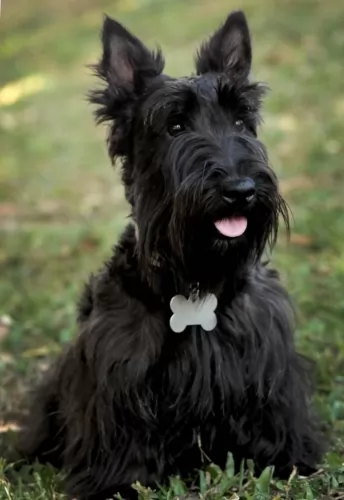 Not much is known about the Scoland Terrier. It is not a purebred but rather a crossbreed developed by crossing the Scottish Terrier with the Westland Terrier. To understand these mixed breeds, look to the original breeds for any combination of the characteristics of the breeds. The offspring of this crossing is not a 50-50 split of the original breeds looks or temperament.
Not much is known about the Scoland Terrier. It is not a purebred but rather a crossbreed developed by crossing the Scottish Terrier with the Westland Terrier. To understand these mixed breeds, look to the original breeds for any combination of the characteristics of the breeds. The offspring of this crossing is not a 50-50 split of the original breeds looks or temperament.
Because the Scoland Terrier is a mix between the Scottie and the Westie he has all the characteristics of a typical terrier perhaps even twice as much. With both parents being terriers, you can expect your Scoland to act like a short legged terrier. These dogs are known for their courage and tenacity. Today these terriers are family companions. Most terriers today come from a pool of ancestral dog in the 19th century in Europe. This information was gleaned from a genetic analysis done in 2006.
The Scoland Terrier, being a hybrid, is not acknowledged by the American Kennel Club (AKC) or the United Kennel Club (UKC). It is acknowledged by the International Designer Canine Registry (IDCR), American Canine Hybrid Club (ACHC), Dog Registry of America, Inc. (DRA), Designer Dogs Kennel Club (DDKC) and Designer Breed Registry (DBR).
 Originating in Wales and bred to hunt the Welsh Terrier might be the oldest dog breed from the U.K. still in existence today. They were bred to hunt badgers, rodents, and fox. Today however they are mostly bred for show and companionship.
Originating in Wales and bred to hunt the Welsh Terrier might be the oldest dog breed from the U.K. still in existence today. They were bred to hunt badgers, rodents, and fox. Today however they are mostly bred for show and companionship.
There are only two breeds of terrier that are native to the country of Wales, the Welsh and the Black and Tan Rough Terrier. It is believed that the Welsh Terrier was descended from that Black and Tan Rough Terrier in the 18th and 19th centuries. The Welsh Terrier was separated out as a separate breed in the late 1700s.
This breed was hunting with the Otterhounds of Wales and was called a Ynysfor. At the same time their was a breed in England, the Old English Broken Haired Terrier. Both breeds were incredibly alike and once the Ynysfor or Welsh Terrier was recognized by the English Kennel Club in 1886. When shown together they were considered the same breed.
Even though all these dogs from Wales and England were considered to be Welsh Terriers, the breed was not recognized until 1886. It is currently on the list of threatened breeds, with only 300 puppies registered every year. They were the 45th breed to be recognized by the English Kennel Club and the AKC. They are recognized by 14 clubs and registries.
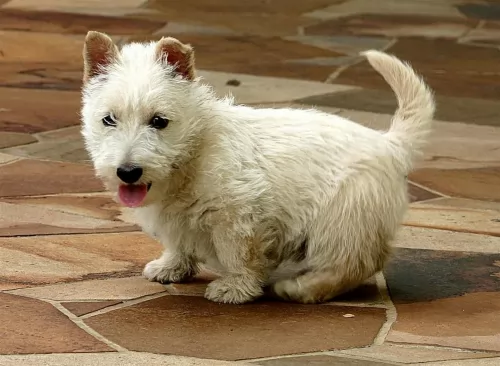 Being a hybrid, the Scoland Terrier will not always look alike and could look like a Scottie, a Westie or a combination of the two. Most breeders of this designer dog say it usually has a body like the Scottie and a round head like the Westie. They are more often black with white markings, but they can often be wheaten as well. With round dark eyes, a scissors bite and black nose, her face is unique. The breed has erect and small, triangular ears and a medium fluffy tale. The coat is hard and wiry, with a dense soft undercoat.
Being a hybrid, the Scoland Terrier will not always look alike and could look like a Scottie, a Westie or a combination of the two. Most breeders of this designer dog say it usually has a body like the Scottie and a round head like the Westie. They are more often black with white markings, but they can often be wheaten as well. With round dark eyes, a scissors bite and black nose, her face is unique. The breed has erect and small, triangular ears and a medium fluffy tale. The coat is hard and wiry, with a dense soft undercoat.
 The Welsh Terrier is a medium sized breed that is compact and sturdy. They had docked tails in the past, but the practice is now illegal in the U.K. The dog is about as long as it is tall. The head and face are elongated with a beard and whiskers. Females are smaller than males, but both are compact and sturdy.
The Welsh Terrier is a medium sized breed that is compact and sturdy. They had docked tails in the past, but the practice is now illegal in the U.K. The dog is about as long as it is tall. The head and face are elongated with a beard and whiskers. Females are smaller than males, but both are compact and sturdy.
Eyes are almond shaped, dark brown and small. The ears are small and V shaped. They should not be thin. The muzzle is square and strong with a black nose. The lips are tight and they are also black.
They have a double coat with is rugged and wiry on top and the undercoat is insulative and softer. The coat is waterproof and protects from wind and dirt as well. The puppies are all black until about 9 months when they become black and tan. The legs, head and underbelly are tan, with a black saddle.
The Welsh Terrier has wiry hair on the legs, muzzle and quarters. The hair is very dense in the top coat. Their gait and movement is straight, effortless and free.
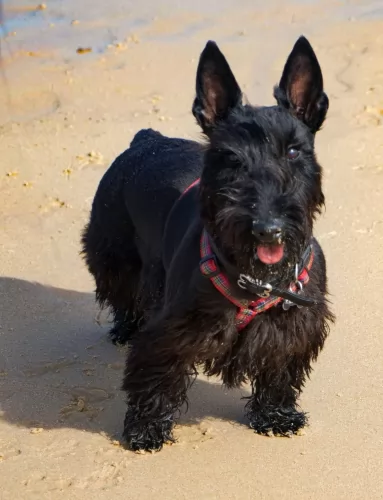 1.Children friendliness - they can be very good with children and children can help them get their exercise.
1.Children friendliness - they can be very good with children and children can help them get their exercise.
3.Adaptability - yes but she is adept at digging and must have a safe enclosure.
 1Children friendliness – The Welsh Terrier is good with kids and will follow them anywhere. They do want to play with the children by tugging on them and could cause a young child to fall. They can learn to play gently with small children.
1Children friendliness – The Welsh Terrier is good with kids and will follow them anywhere. They do want to play with the children by tugging on them and could cause a young child to fall. They can learn to play gently with small children.
3.Adaptability – They do fine in smaller indoor spaces as long as they have a robust exercise routine daily. They will be active indoors.
4.Learning ability -They are very smart, independent thinkers as can been seen by their ability to learn to play gently with small children. They need plenty of socialization early in life
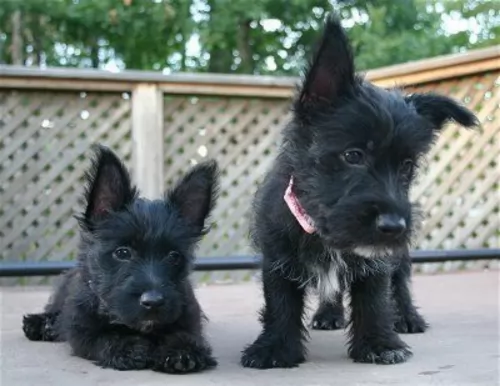 This hybrid dog can inherit any of the issues faced by its two parent breeds. For the Scoland Terrier this can include:
This hybrid dog can inherit any of the issues faced by its two parent breeds. For the Scoland Terrier this can include:
• Seborrhea – Skin disease that can cause dogs to scratch until bleeding and/or infected.
• Carniomandibular Osteopathy -called lion’s jaw this is a developmental disease that causes extensive changes in the bones of the mandible and skull.
• Pulmonic Stenosis – when the blood flowing from the heart’s right ventricul to the pulmonary artery is blocked.
• PPM or Persistent Pupillary Membranes - causes visual impairment when the membranes do not dissolve after birth.
• Chronic Hepatitis – disease of the liver that can eventually cause major damage.
 The Welsh Terrier is a fairly healthy hunting dog, though they do have some health issues.
The Welsh Terrier is a fairly healthy hunting dog, though they do have some health issues.
• Onychodystrophy – Nails grow weak and are very brittle. They can break easily and cause pain, irritation and even infections.
• Primary lens luxation – causes secondary glaucoma which can cause blindness.
• If hunting, they are exposed to hunting injuries and should be checked over well after a field adventure, whether hunting or in field trials.
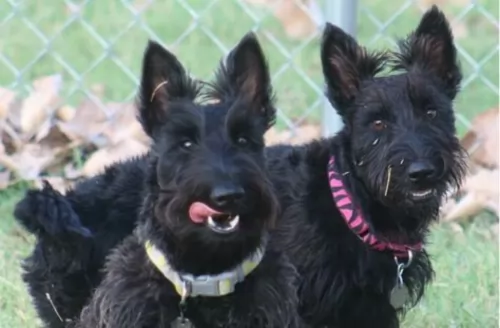 1.Feeding the puppy - Give a high quality puppy dog food designed for terriers or active medium sized dogs. Give ¾ of a cup over 3 meals a day.
1.Feeding the puppy - Give a high quality puppy dog food designed for terriers or active medium sized dogs. Give ¾ of a cup over 3 meals a day.
2.Feeding the adult – Give a high quality adult dog food designed for terriers or active medium sized dogs. Give one cup over two meals a day.
4. Games and Exercises – The Scoland Terrier is a very active dog and needs daily exercise, He need time to play, run, and be stimulated by games. She would be very good at flyball, Frisbee, fetch, agility, barn hunt, and obedience. He needs at least 2 hours of play and exercise everyday.
 1.Feeding the puppy – the breed is prone towards obesity so do not overfeed wither the puppy or the adult. Watch the calorie level and make sure they get high quality, high protein feed meant for the breed or for medium sized dogs. Feed the puppies small amount 3-4 times per day.
1.Feeding the puppy – the breed is prone towards obesity so do not overfeed wither the puppy or the adult. Watch the calorie level and make sure they get high quality, high protein feed meant for the breed or for medium sized dogs. Feed the puppies small amount 3-4 times per day.
2.Feeding the adult - the breed is prone towards obesity so do not overfeed wither the puppy or the adult. Watch the calorie level and make sure they get high quality, high protein feed meant for the breed or for medium sized dogs. Feed the adult at least 2 times per day.
4. Games and Exercises Full of energy and requiring a routine outlet for that energy, the Welsh Terrier is an active dog. Just running around a fenced yard all day will not be enough physical and mental stimulation for them. If bored they can get into trouble. They need a job or a challenge. They love to swim and they love to chase. They do well in agility, field trials and barnhunt.